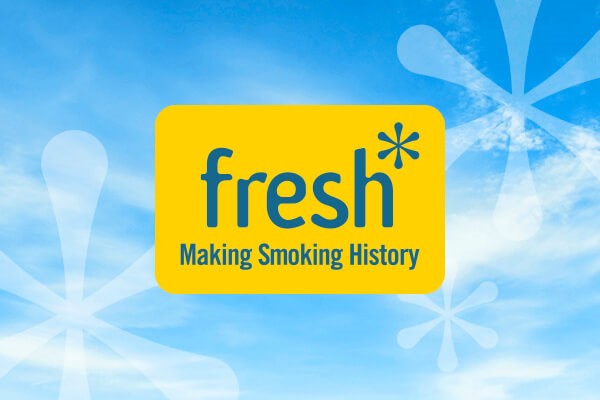Big tobacco claims about illegal tobacco are nonsense
FRESH has accused multinational tobacco giants of mounting a lobbying campaign in the North East using dubious statistics and scaremongering to undermine proposals to reduce the lure of smoking to children.
Fresh criticised tobacco companies for putting out misleading information on the size of the illegal tobacco market, which official statistics show has halved in the last decade, as part of an orchestrated campaign against plain, standardised packaging.
After serious increases in illegal tobacco smuggling in the 1990s, the illegal tobacco market has halved in the last decade due to tough international controls and heavy restrictions on tobacco companies supply chains.
The latest official statistics from HMRC show that less than one in ten cigarettes was illegal in 2011 (9%) compared to over one in five cigarettes (21%) back in 2000. Increasingly the most seized illegal cigarettes across Europe have been brands like Jin Ling – openly mass manufactured in Kaliningrad specifically for the illegal market – rather than fakes.
Australia becomes the first country in the world to introduce standardised packaging on tobacco on December 1. Standardised packs will be introduced in Australia on December 1. Evidence shows the standardised packs will be less attractive, especially to non-smokers and children, and put a stop to tobacco companies suggesting one brand is less harmful than another.
A major new report from Cancer Research UK by Luc Joosens, who has advised the World Bank, the European Commission and World Health Organisation on the illegal tobacco trade, found there is no evidence that replacing glossy designs on cigarette packs with a plain, standardised look will increase the illicit trade.
One recent industry report even claimed illegal tobacco had risen by the third in the North East in the last year – based on researchers looking through discarded litter. This is at odds with the much more robust HMRC statistics.
Fresh, along with Tobacco Free Futures and the North East Trading Standards Association, will be presenting evidence to the All Party Parliamentary Group on Smoking Inquiry into Illicit Tobacco on 6th December based on experiences of tackling the problem in the North East.
Ailsa Rutter, Director of Fresh, said: “We are seeing shameful tactics from an industry whose product kills half of its long term customers, most of whom got hooked in childhood. They are hyping fear of illegal tobacco and putting out dubious statistics while fighting the idea of standardised packs – the measure they fear will hit its profits most.
“Putting all tobacco products in standardised packs will reduce their allure to children and help lead to fewer young people wanting to try cigarettes.
“The tobacco industry has a long history of helping to fuel the smuggling problem while at the same time claiming policies that cut smoking will increase smuggling, even though smuggling has halved in a decade. Claims that standardised packaging will suddenly make smokers run to the nearest tobacco smuggler are ridiculous.
“This is a discredited industry which spent the last century misleading people about the harm of smoking and is now trying to pull the wool over our eyes again. We would encourage people to keep them at arms’ length.”
Richard Ferry, of the North East Trading Standards Association, said: “Illegal tobacco is a problem in some areas, but the size of the market has halved over the last decade due to tough regulation of the supply of tobacco and massive improvements in detection.
“There is no evidence standardised packs will fuel illegal tobacco. Criminals can already copy the most complicated design of cigarettes, hair straighteners or trainers and have them on the market within weeks. Packs will still have coded identifiers so enforcement teams can tell legal from illegal tobacco.
“But increasingly we have seen seizures of brands like Jin Ling which are mass manufactured openly in countries like Kaliningrad and distributed around Europe for the illegal market , rather than fakes.”
As well as HMRC statistics, robust research in the North East shows illegal tobacco is reducing. The North of England Tackling Illegal Tobacco for Better Health Programme – set up to bring together the work of the NHS, HMRC, councils and police – has helped result in the volume of illegal tobacco bought falling by 39% in the North East from 2009-11 – worth over £36m less avoided in duty and VAT evasion.
Evidence in the Cancer Research UK report – already acknowledged in recent tobacco industry documents – demolishes arguments against the introduction of plain packs and shows that counterfeit producers find all existing packs easy to forge. Plain, standardised packs are unlikely to cause a rush of new counterfeiters making more packs.
It also shows that counterfeit packs are so cheap to make they can hardly become much cheaper and plain packaging will not significantly affect their final price. The report also shows that it is effective government action that has been successful in cutting the illicit trade.
Luk Joossens, report author and international expert on illicit tobacco trade, said: “The tobacco industry claims that plain packs would be easier to counterfeit. The reality is that all packs are easy to counterfeit and that counterfeiters are able to provide top quality packaging at low prices in a short time. Plain packaging will not make any difference to the counterfeit business.”
